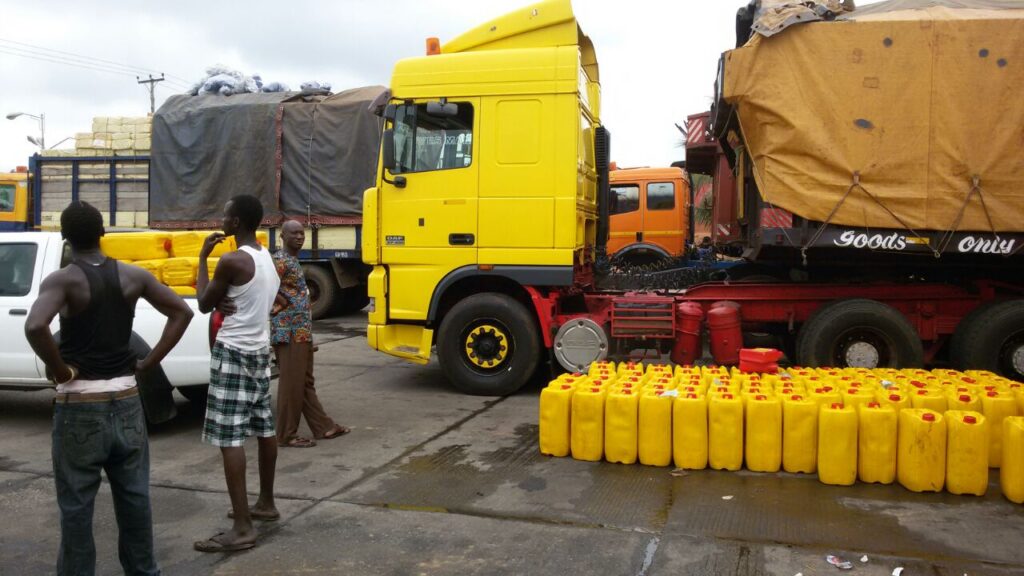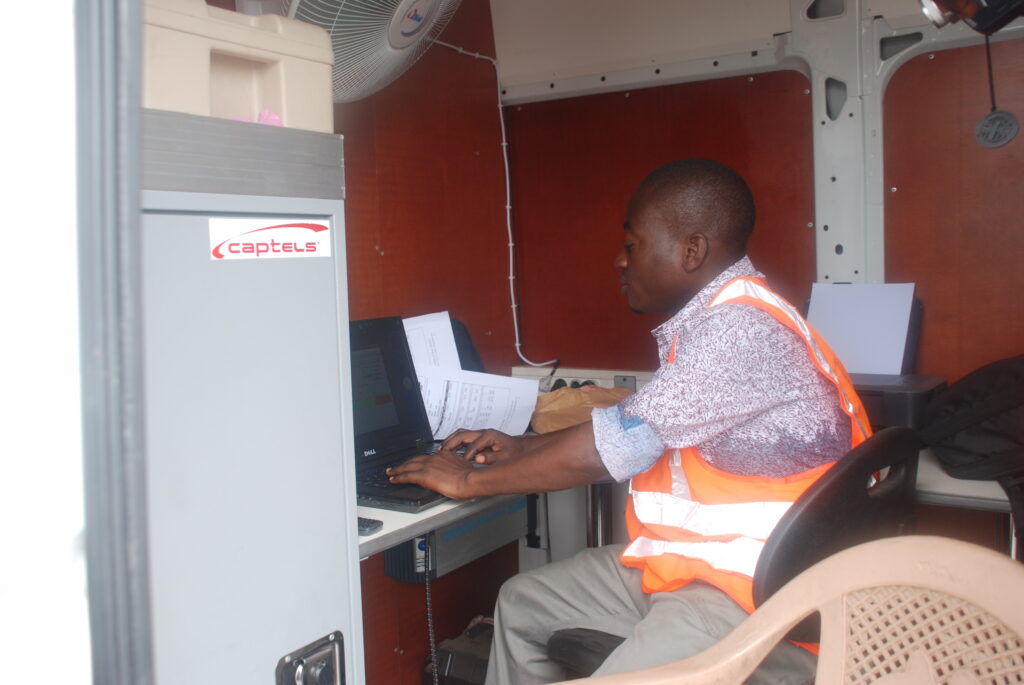Corruption and mismanagement threaten Ghana Highway Authority weighbridges
 Huge disparities under new leadership exposes deep corruption in Ghana Highway Authority’s (GHA) weighbridges revenue collection, as management records differences more than twice the volume collected following the change-over.
Huge disparities under new leadership exposes deep corruption in Ghana Highway Authority’s (GHA) weighbridges revenue collection, as management records differences more than twice the volume collected following the change-over.
For instance, the Akom weighbridge from January to July 2024, recorded a total of over GH¢12.7 million compared to the Motorway’s GH¢6.6 million.
Weighbridges play a crucial role in Ghana’s transportation system. They are large scales installed on major roads that weigh vehicles, particularly heavy-duty trucks and commercial transport vehicles. The purpose of these weighbridges is to ensure that vehicles, especially those carrying heavy loads, do not exceed the maximum weight limit allowed on the roads.
The maximum weight limit, often referred to as the “axle load,” is the maximum amount of weight that can be carried on each individual axle of a vehicle. Overloaded vehicles can cause significant damage to roads, bridges, and other critical transportation infrastructure. This damage leads to increased maintenance and repair costs, as well as safety hazards for other drivers.
By monitoring vehicle weights at the weighbridges, the authorities can enforce weight limits and levy fines on overloaded vehicles. This helps to protect the roads and ensure that the transportation network remains safe and functional for all users.
For the ordinary person, the weighbridges play an important role in maintaining the quality of the roads they use every day. When trucks and commercial vehicles are properly weighed and fined for overloading, it helps to prevent the rapid deterioration of the roads, potholes, and other issues that can make driving hazardous.
The dramatic surge in revenue at the Akom weighbridge has raised serious concerns about potential corruption and mismanagement within the GHA’s weighbridge operations. This scandal threatens to undermine the very purpose of these weighbridges, which is to safeguard the country’s transportation infrastructure and promote road safety for all Ghanaians.
Weighbridges, once a guardian of road safety and infrastructure integrity, have become the focal point of a saga that has raised serious questions about the previous operations and potential underhanded dealings at these crucial facilities.

The Akom weighbridge, located in the heart of the Ashanti Region, off the Kumasi-Offinso road, has seen a dramatic surge in revenue under a new supervisor, with figures from the GHA revealing that the highest revenue ever recorded before a new supervisor took over in March, 2024, was GH¢608,159.00 in December 2023 but under the new supervisor, the station raked in GH¢3.1 million in April 2024. This drastic increase has raised alarms, suggesting potential irregularities in the previous operations.
Even though the Tema Motorway weighbridge station led in revenue generation from January 2022 to December 2023, the Akom weighbridge outperformed it from January to July 2024, recording GH¢12,760,864.00 compared to the Motorway’s GH¢6,617,763.52. This disparity has further fueled concerns about the efficiency and transparency of the system.
Allegations have also surfaced that GHA sector coordinators are strategically placing their acquaintances in lucrative positions at the weighbridges to facilitate financial arrangements. This has led to concerns about the integrity of the system, as the low monthly salaries of GH¢900.00 for weighbridge supervisors’ contrast sharply with reports of some employees acquiring vehicles and houses.
The GHA has stated that the weighbridge supervisors are hired on six-month contracts, subject to renewal based on their performance. The supervisors are required to undergo periodic training and examinations every six months. Their contracts are then renewed, or they are reposted or retained based on their satisfactory performance in these assessments.
This suggests that the appointments and retention of the weighbridge supervisors are linked to their demonstrated competence and compliance, rather than being solely at the discretion of the Weighbridge Manager and sector coordinators. However, the allegations of cronyism and the stark discrepancy between supervisors’ salaries and some employees’ assets have raised red flags about potential irregularities in the system.
Investigations have uncovered irregularities extending beyond the Akom station, with the weighbridge network, designed to ensure road safety and deter overloading, reportedly failing. Reports of corruption, such as employees allegedly accepting payments to overlook overloaded vehicles, and equipment tampering to allow overweight trucks to pass, have raised alarms.
Mr. Joseph K. Horgle, a transportation consultant, expressed deep concern over the current state of affairs in the transportation monitoring network. His concerns stem from the widespread irregularities that have significantly undermined the credibility of the entire system. In response to these challenges, he has proposed an innovative solution that could potentially revolutionize the way fines and penalties are collected in the transportation sector.
The cornerstone of Mr. Horgle’s proposal is the implementation of a comprehensive digital or electronic system for fine collection. This system would fundamentally transform the current process by eliminating direct human interaction, thereby significantly reducing the potential for corruption and mishandling of funds. The proposed framework is both robust and multifaceted, designed to address the various pain points in the current system.

At the heart of this new system is an automated detection mechanism. When a vehicle arrives at a weighbridge station, the system would instantly calculate any excess weight and determine the appropriate fine. This automation eliminates human error and potential manipulation in the calculation process, ensuring fairness and consistency across all weighbridge stations.
Once a violation is detected, the system would generate a unique digital chit or voucher. This digital ticket would contain all pertinent information about the violation, including the vehicle details, the extent of the overweight issue, and the calculated fine. By digitizing this process, the system ensures that all information is accurately recorded and easily traceable, significantly reducing the risk of loss or tampered paper tickets.
To facilitate payment, the system would incorporate secure digital payment channels. Transporters would have the flexibility to pay their fines through various modern methods such as mobile money platforms, online banking, or at designated payment kiosks. This approach not only makes the payment process more convenient for transporters but also creates a clear and auditable trail of all transactions, enhancing transparency and accountability.
The verification process in this new system would be swift and efficient. As soon as payment is made, the system will instantly update the status of the fine. Transporters would receive a digital receipt or confirmation code, providing them with immediate proof of payment. This real-time update eliminates delays and reduces the potential for disputes over payment status.
Even though the Tema Motorway weighbridge station led in revenue generation from January 2022 to December 2023, the Akom weighbridge outperformed it from January to July 2024, recording GH¢12,760,864.00 compared to the Motorway’s GH¢6,617,763.52. This disparity has further fueled concerns about the efficiency and transparency of the system.
Before being allowed to continue their journey or offload excess cargo, transporters would need to present their digital confirmation at the weighbridge station. Staff at the station would then verify the payment status through the centralized system. This step ensures compliance and prevents vehicles from bypassing the fine payment process.
He said one of the most significant advantages of this proposed system is its capability for real-time monitoring. All processes and transactions would be tracked instantaneously, providing relevant authorities with valuable oversight and data analysis capabilities. This feature not only aids immediate decision-making but also contributes to long-term policy formulation and infrastructure planning.
Mr. Horgle emphasized that the digitalization of the entire process would bring about a multitude of benefits.
“It would significantly enhance transparency, drastically reduce the risk of fraud, and improve overall efficiency in the transportation sector. Moreover, the accurate collection of fines would ensure that appropriate revenues are collected, while the data generated could prove invaluable for future improvements in transportation infrastructure and policies,” he said.
In concluding, Mr. Horgle stressed the urgency of implementing these changes. He argued that a swift transition to this digital system is crucial for restoring public trust in weighbridge operations. Furthermore, he emphasized that this new system would play a vital role in ensuring that Ghana’s roads are used responsibly and safely, contributing to the overall improvement of the country’s transportation infrastructure.
The GHA is however aware of the pressing issues and has taken some measures to address them.
“Management has given approval to adjust the salaries of its contract weighbridge supervisors,” a GHA official said. The Authority is also putting a weighing device on the Tema Beach Road to enhance efficiency.
The Authority further stated that it periodically organizes training and exams for the coordinators and supervisors, with the exams held every six months as the supervisors’ contracts are for six months, subject to renewal based on satisfactory performances.
According to the GHA, government was also supporting the Authority to build more weighbridge stations across various roads to prevent those who think they can avoid the system from doing so. Additionally, more mobile weigh vans are being procured to enhance the monitoring and enforcement capabilities.
As Ghana navigates these weighty issues, the stakes are high. The outcome will have significant implications for road safety, infrastructure longevity, and economic development, serving as a litmus test for the country’s commitment to transparency and good governance.
The story of Ghana’s weighbridge operations is not just about regulatory failure; it highlights the ongoing struggle against corruption and the importance of robust systems in public infrastructure management. The nation stands at a crucial juncture, facing a choice: seize the opportunity for reform or yield to the entrenched interests and systemic corruption that threaten to undermine progress.
Ultimately, the true test lies not in the proposals or policies enacted, but in the nation’s willingness to demand better, hold leaders accountable, and strive for a future where corruption no longer jeopardizes the development of a safe and efficient transport system.
By Innocent Samuel Appiah
Copyright ©2024 by NewsBridge Africa
All rights reserved. This article or any portion thereof may not be reproduced or used in any manner whatsoever without the express written permission of the publisher except for the use of brief quotations in reviews.
